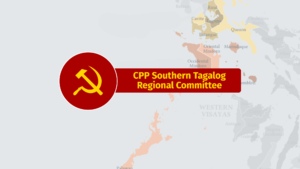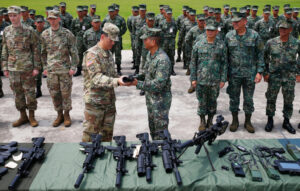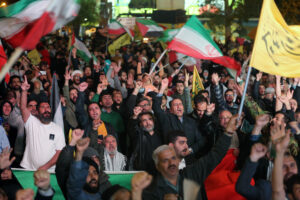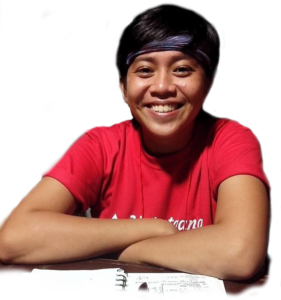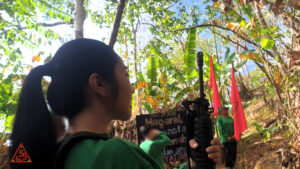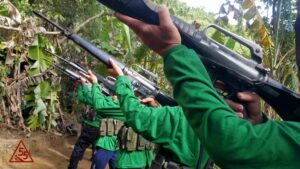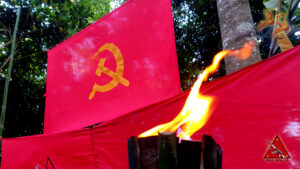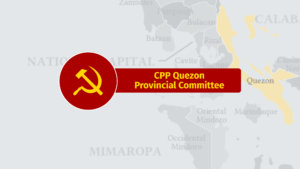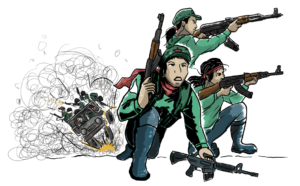On ruling class rivalries under Duterte and prospects of a tactical alliance
Over the past two weeks or so, factional rivalries among the ruling elite have rapidly boiled over with sharp and often zealous and brazen political attacks and counter-attacks by both the dominant Duterte political conglomeration and the anti-Duterte camp of reactionaries identified with the deposed Liberal Party.
The intensity characterizing the ruling class rivalries is evidence of the deep-seated crisis of the semicolonial and semifeudal system. This is the same moribund and oppressive sysem that the Filipino people desire to end which in turn propelled Duterte to electoral victory last May. The seething conflicts, just a few months since the last presidential elections, reveal how it failed to build a consensus among the rival elite factions.
Upon installation on June 30, the Duterte camp quickly moved to consolidate its power by establishing its control over the bureaucracy, the military and police and laying out the foundations of its political rule: the anti-drug war, peace talks with the NDFP and an independent foreign policy.
Not soon after the elections, the anti-Duterte elite faction would raise the question of human rights, demanding accountability of the newly installed president for the spate of killings related to the anti-drug war in Davao City while he was mayor. They will soon be joined by the New York-based Human Rights Watch, revealing early on the anti-Duterte tact of using the question of human rights.
Duterte would soon use the anti-drug war in his attacks against his rivals in the bureaucracy and the PNP, coming-up with so-called matrices identifying police generals and personnel, town mayors and judges as drug “personalities”. He will eventually cause the replacement of 15 of 18 regional PNP directors as well hundreds of police officials at the provincial and town levels.
Duterte’s insolent bombast in his declared anti-drug war would highlight a spiral of violence. At least 3,200 people have been killed in less than three months, of which almost 40% were killed in police operations most of whom supposedly “resisted” arrest. Invariably, such incidents have raised complaints of summary killings by police officers emboldened by Duterte’s assurances that they will not be prosecuted and will instead by rewarded for killing criminals.
Besides the matter of summary killings, the revolutionary forces as well as aboveground democratic forces have raised criticism against Duterte’s anti-drug war as being wrongfully directed at small users and peddlers who are mostly victims of the illegal drug trade and for applying methods of state violence against them.
They have asserted that the drug problem should be mainly addressed as a socio-economic issue by resolving the widespread problem of joblessness and social desperation. They have pointed out how the anti-drug war cannot be won by mobilizing the PNP and AFP , whose top officials are mostly involved in the illegal drug trade themselves.
The national democratic forces, however, stand against foreign meddling and against the hypocritical use of the issue of human rights as an instrument of intervention. The US imperialists are now applying its trite human rights intervention tactic on the Philippines against the Duterte regime.
In response, GRP President Duterte has become increasingly assertive of the principle of non-intervention and the country’s right to have an independent foreign policy. He has called for the removal of US troops in Mindanao asserting that their presence makes the Philippines a target of terrorism. He has declared that the Philippine military will no longer join US-led “sea patrols” over the South China Sea. He has expressed openness to purchase weapons at lower prices from Russia and China which can result in less reliance on US military aid.
There has now emerged a new aspect in the factional rivalries within the ruling classes with the increasingly anti-foreign meddling pronouncements of GRP President Duterte that is shaking the foundations of the neocolonial state.
Since the Philippines became a US semicolony in 1946, the various factions of the Philippine reactionary elite have invariably remained loyalists of the US and its economic, military and geo-political policy dictates. In the past, factional rivalries have often been resolved through the intervention of US officials who have maintained links with all major political parties and government agencies.
This is no longer the case. The reactionary faction in power—the Duterte camp—has now come forward openly opposed to US meddling, challenging the political sway of US imperialism.
The anti-Duterte reactionaries are outraged at Duterte’s aggressive assertion of independence and opposition to US and EU meddling. On the other hand, pro-Duterte reactionaries who have long looked up to the US as their masters, especially US-indoctrinated officials of the AFP, are also quite perturbed and seek to soften his attacks against US meddling and pull him back from efforts at establishing equal relations with China, Russia, the US and other countries.
Having established himself firmly as a non-puppet, it would come as no surprise that the US government is now planning to unseat Duterte. That the anti-Duterte politicians are mouthing the same line raised by the US and its UN cohorts reveal congruence if not connivance.
Duterte has come out publicly pointing to threats to its rule including the possibility of a US-backed coup d’etat. He claims that Liberal Party stalwarts are plotting against him. His officials also said New York-based Fil-Ams are hatching an ouster plot set on or before January 2017.
The Duterte regime has applied audacious attacks against those it considers as threats. It has resorted to drug witchunting its opponents and using the anti-drug war as an instrument in the ruling elite factional conflict. Duterte’s supermajority in congress has launched a farcical congressional investigation on Sen. Leila de Lima’s drug links and pin her down as a “narco-politician.” She was ousted as head of the Committee on Justice andHuman Rights of the senate. De Lima served as the tip of the anti-Duterte arrow, leading efforts to turn the anti-drug war against Duterte.
The factional rivalries within the reactionary ruling classes have rapidly intensified amid the rising conflict between the US imperialists and the burgeoning imperialist China. Having firmly established himself as someone not to kowtow to the US, Duterte has become more vocal in his desire to promote economic, diplomatic and military relations with China and Russia.
If successful, his plan to pursue a peaceful and mutually acceptable resolution of the South China Sea conflict with China and other claimants to maritime rights can serve as basis for strong clamor to demilitarize the international trade route.
He can promote trade and economic ties with China, as well as with other countries outside the political ambit of the US without necessarily cutting ties with the US-aligned Western world.
The revolutionary forces must respond appropriately to the crisis of the ruling political system and the seething ruling class rivalries. They must adapt and employ the correct tactics with the aim of advancing the national democratic interests of the Filipino people and building their organized and armed strength for waging people’s war.
A tactical patriotic and democratic alliance between the Duterte camp and the NDFP can be mutually beneficial. Duterte can seek the support of the national democratic forces and make peace with its revolutionary armed forces by agreeing to work together to advance the people’s aspirations for national freedom, democracy, social justice and socio-economic progress.
Agreements that can be forged through peace negotiations between the Duterte regime and the NDFP can serve as a framework of a united front against threats of subversion and intervention by the US imperialists and its coterie of loyalists among the Philippine ruling elite.
The revolutionary forces are fully conscious that US imperialism and its economic, social and political base in the Philippines remain dominant and will use all their power and means to ensure that the country will remain a client-state of the US. They are also fully conscious that reactionary big comprador bourgeoisie, big land owners and their foreign big business partners behind Duterte seek to perpetuate the neoliberal policies that oppress the working class and Filipino people regardless of his assertion of national independence.
Whether or not Duterte will be able to withstand US pressure and remain in power, the revolutionary movement must be able to maintain its own political power. This is principally achieved by strengthening the New People’s Army (NPA) in terms of number of Red fighters and firearms and by continuing to build and expand the scope of the people’s democratic government.

